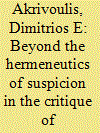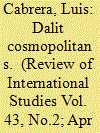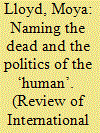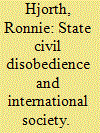|
|
|
Sort Order |
|
|
|
Items / Page
|
|
|
|
|
|
|
| Srl | Item |
| 1 |
ID:
151638


|
|
|
|
|
| Summary/Abstract |
Realist and Marxist critiques of humanitarian intervention are distinctively materialistic in scope. The IR literature has already described this scepticism as a ‘hermeneutics of suspicion’, a term associated with the work of Paul Ricoeur, which aims to unearth the intervenors’ material and geopolitical interests hypocritically hidden behind the pretext of humanitarianism. The article first notes the decontextualised misappropriations of the term as an iconic and omnipotent instrument of doubt, as well as the limitations of the social constructivist response on the matter. By contextualising Ricoeur’s hermeneutics of suspicion as developed in his life work, the article then calls for an extension of critique from a hermeneutics of suspicion to a hermeneutics of naïveté. Applied in the critique of the ideology of humanitarian intervention, the article thus calls for a shift of focus from the examination of the distorting (Marxism, realism) and legitimising (social constructivism) functions of this ideology to its integrating function that has allowed the evocation of humanitarian principles as international norms, and uncritically vindicates this arrangement. The article proposes that this hermeneutical detour could allow critique to proceed to a greater analytical depth, opening up a set of critical questions.
|
|
|
|
|
|
|
|
|
|
|
|
|
|
|
|
| 2 |
ID:
151640


|
|
|
|
|
| Summary/Abstract |
Besides stating that global or cosmopolitan citizenship is an incoherent concept in the absence of a global state, some critics assert that it represents a form of Western-centric moral neoimperialism. This article develops some responses to such objections through examining the efforts of Indian activists who have undertaken intensive international engagement in their struggles against caste discrimination. The National Campaign on Dalit Human Rights has sought to close domestic rights-implementation gaps for Dalits (formerly called untouchables) in part through vertical outreach to United Nations human rights bodies. This mode of outreach is shown to represent an important practice of global citizenship, and to challenge a view of South agent as primarily passive recipients of moral goods within a global citizenship frame. Further, the Dalit activists’ global citizenship practice is shown to be significantly ‘institutionally developmental’, in that it highlights implementation gaps in the global human rights regime and can contribute to pressures for suprastate institutional transformation and development to address them. NCDHR actions are, for example, highly salient to the recently renewed dialogue on creating a World Court of Human Rights.
|
|
|
|
|
|
|
|
|
|
|
|
|
|
|
|
| 3 |
ID:
151636


|
|
|
|
|
| Summary/Abstract |
Scholars of international organisation commonly differentiate among three dimensions when studying the legitimacy of international institutions: input, throughput, and output legitimacy. I argue that the study of global governance needs to consider a fourth ‘face’ of legitimacy: constitutional legitimacy. This dimension addresses the normative and practical questions related to the constitutive justification for an institutional order – such as in whose name it is founded, whose interests it should serve, and how authority should be distributed within that institutional order. These questions are distinct from the procedural features of institutions emphasised by other dimensions and concern the constituent power that should ground the authority of governance institutions. In this article, I develop this fourth dimension of legitimacy, explore its varied expressions in world politics, and show how it has implications for the constitutional structure of global governance arrangements. I argue that different representations of constituent power shape the legitimacy of different authority relations within international institutions and illustrate these claims with an analysis of the politics of legitimacy in three cases: the ongoing effort to reform the UN Security Council, the negotiations over the founding of the International Criminal Court, and the debates over the Responsibility to Protect at the UN.
|
|
|
|
|
|
|
|
|
|
|
|
|
|
|
|
| 4 |
ID:
151643


|
|
|
|
|
| Summary/Abstract |
In the field of political theory, few authors have spurred intellectual tirades and triggered collective fantasy as much as the sixteenth-century Florentine Secretary Niccoló Machiavelli. Despite all controversies, in the discipline of International Relations (IR) Machiavelli and his The Prince have been almost exclusively associated with classical realism. This largely unchallenged association contributed to the edification of the myth of The Prince as the ruthless symbol of raison d’état, carrying transcendental lessons about the nature of politics and a set of prescriptions on how helmsmen should behave to seize, maintain, and reinforce their power. The realist hijacking of Machiavelli is at the core of the foundation of classical realism as an IR theory and its location at the very epicentre of IR as a discipline. This appropriation has, in turn, obscured alternative myths of The Prince, which depart from Machiavelli’s reflections on the Principati nuovi to read The Prince as a radical manifesto for political change. The opening of the semantic space in the field of IR – spurred by the so-called interpretive turn – offers an opportunity to break this monochromatic reading. This article delves into two competing myths of The Prince: the classical realist myth and Gramsci’s ‘progressive’ one to demonstrate its contested nature.
|
|
|
|
|
|
|
|
|
|
|
|
|
|
|
|
| 5 |
ID:
151644


|
|
|
|
|
| Summary/Abstract |
This article considers what the nineteenth century can tell us about the nature of great power management under conditions of ambiguity in relation to the holders of great power status. It charts the development of an institutionalised role for the great powers as managers of international society but with a specific focus on the mutual recognition, and conferral, of status. Such a focus highlights the changing, and sometimes competing, perceptions of not only which states should be thought of as great powers, but also therefore whether the power structure of international society remained multipolar or shifted towards bipolarity or even unipolarity. The article argues that a ‘golden age’ of great power management existed during a period in which perceptions of great power status were in fact more fluid than the standard literature accounts for. This means that predictions surrounding the imminent demise of the social institution of great power management under an increasingly ambiguous interstate order today may well be misplaced.
|
|
|
|
|
|
|
|
|
|
|
|
|
|
|
|
| 6 |
ID:
151641


|
|
|
|
|
| Summary/Abstract |
The emergence of the transnational as a site and object of governance has triggered concern amongst both affected publics subject to these effects, and scholars keen to locate the democratic potentials therein. Increasingly, public sphere theory is being promoted as a lens for interrogating the democratic potential of the transnational. However the project of transposing public sphere theory from its Westphalian origins to the transnational has been frustrated by a lack of empirical examples in which the properties of a transnational public sphere can be easily identified. In this article, examining the encounter between La Vía Campesina and the UN Committee on World Food Security, I argue for the existence of a nascent transnational public sphere in the specific domain of transnational food and agricultural policymaking. The existence of this concrete example, I argue, defends public sphere theory’s transnational turn against either the charge of utopianism, or the need to suspend some of the framework’s core conditions in order to accommodate the ‘actually possible’. It also allows us to advance public sphere theory’s empirical research agenda, and in this article I introduce an analytical framework to take this further.
|
|
|
|
|
|
|
|
|
|
|
|
|
|
|
|
| 7 |
ID:
151639


|
|
|
|
|
| Summary/Abstract |
The summer of 2014 saw several campaigns to name the dead of Gaza. This article aims to explore these initiatives through the idea of the ‘human’; understood both in terms of grievability, as a life that matters, and as a ‘litigious name’ employed by subaltern groups to make political demands. My argument in this article is that politically not all attempts at nomination are equivalent and that a distinction needs to be drawn between those carried out on behalf of the ‘ungrievable’ and those engaged in by them. Only the latter enables a critical politics of the human potentially capable of transforming the prevailing order of grievability in order to make their lives count. After exploring the interventions that occurred in Gaza in 2014, I turn to how the Western (and Israeli) media represent international deaths to consider what that reveals about the differential valuation of human life. To help make my case I elaborate the idea of an order of grievability. I then explore various attempts by others to name Gaza’s dead, and the limitations of their ensuing politics, before finally examining the activities of Humanize Palestine as an example of a more radical, critical politics of the human.
|
|
|
|
|
|
|
|
|
|
|
|
|
|
|
|
| 8 |
ID:
151642


|
|
|
|
|
| Summary/Abstract |
This article examines the concept of State Civil Disobedience (SCD) in the context of international society. It is argued that SCD is problematic for several reasons. First, that SCD is extremely difficult to practice in an association such as international society, relying, as it does, a great deal on the policies and powers of a few dominating actors; second, that the unequal status of states makes SCD mainly an instrument of the strong, hence undermining not only the idea of civil disobedience as the strategy of the weak but also questioning the role of SCD within an international society based on the formal equality of states. It is concluded that the practice of SCD in international society requires an invigoration of international society as a moral association. A more practical alternative, it is argued, is to conceive of a limited concept of SCD confined largely to non-violent means and preferably practiced in order to resist legal anomalies.
|
|
|
|
|
|
|
|
|
|
|
|
|
|
|
|
|
|
|
|
|